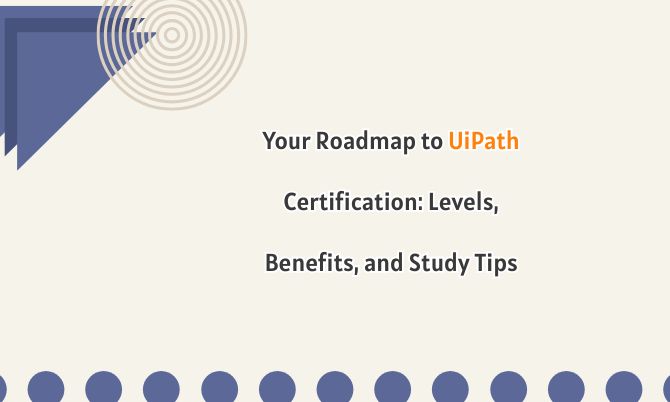UiPath certifications are designed to validate and enhance professionals' automation skills. These certifications are globally recognized and cater to various roles within the automation landscape, from developers to business analysts. UiPath's certification is structured to assess and validate the skills of individuals in designing, developing, and managing automation solutions using UiPath's tools. The certifications are divided into two main levels: Associate and Professional. The Associate level is tailored for individuals new to RPA, focusing on foundational knowledge, while the Professional level targets experienced practitioners, emphasizing advanced skills and complex automation solutions.

UiPath offers a range of certifications to cater to different professional roles and experience levels. Some of the top certifications include:
Target Audience: Beginners, recent graduates, or professionals new to RPA.
Required Exam: UiPath-ADAv1 UiPath Automation Developer Associate v1 Exam
This certification is an entry-level credential that validates foundational knowledge and practical skills in designing simple automation processes using UiPath Studio. It covers basic debugging, exception handling, UI automation, and the use of selectors.
Target Audience: Experienced RPA developers and solution architects.
Required Exam: UIPATH-ADPV1 UiPath (ADPv1) Automation Developer Professional Exam
This advanced-level certification assesses your ability to build complex, scalable, and efficient automation solutions. Candidates are expected to demonstrate proficiency in REFramework, orchestrator queues, logging, and exception handling in real-world scenarios.
Target Audience: Junior to mid-level business analysts and process consultants.
Required Exam: UiPath-ABAAv1 UiPath Automation Business Analyst Associate Exam
This certification evaluates a candidate's ability to collaborate with stakeholders, document business requirements, and identify automation opportunities. It focuses on the analysis and design phase of RPA projects.
Target Audience: Experienced business analysts or consultants with a solid RPA project background.
Required Exam: UiPath-ABAv1 UiPath Automation Business Analyst Exam
Aimed at professionals who lead automation analysis efforts, this certification validates expertise in solution scoping, change management, stakeholder communication, and post-deployment validation
Earning a UiPath certification offers several advantages:
Global Recognition: UiPath certifications are acknowledged worldwide, enhancing your professional credibility and making your profile stand out in the job market.
Career Advancement: Certified professionals often experience increased job opportunities, higher salaries, and greater responsibilities within their organizations.
Skill Enhancement: The certification process ensures that individuals are well-versed in UiPath's best practices, tools, and methodologies, leading to improved performance in automation projects.
To effectively prepare for a UiPath certification exam:
Understand the Exam Structure: Familiarize yourself with the exam's format, topics covered, and question types by reviewing the official exam description documents.
Utilize UiPath Academy: Leverage the free training resources and learning plans available on UiPath Academy to build a strong foundation in RPA concepts and UiPath tools.
Hands-On Practice: Engage in practical exercises using UiPath Studio and Orchestrator to gain real-world experience in building automation workflows.
Take Real Exam Questions: Assess your readiness by attempting real exam questions, which can help identify areas needing improvement and build confidence.
Join Study Groups: Participate in online forums and study groups to exchange knowledge, discuss challenges, and gain insights from peers preparing for the same certification.
UiPath certification represents a valuable investment in your professional development within the RPA industry. Whether you're starting with an Associate-level certification or advancing to Professional credentials, the knowledge and recognition gained can significantly impact your career trajectory. The structured learning path, combined with practical experience and proper preparation, ensures that certified professionals are well-equipped to meet the growing demands of automation projects in today's digital landscape.